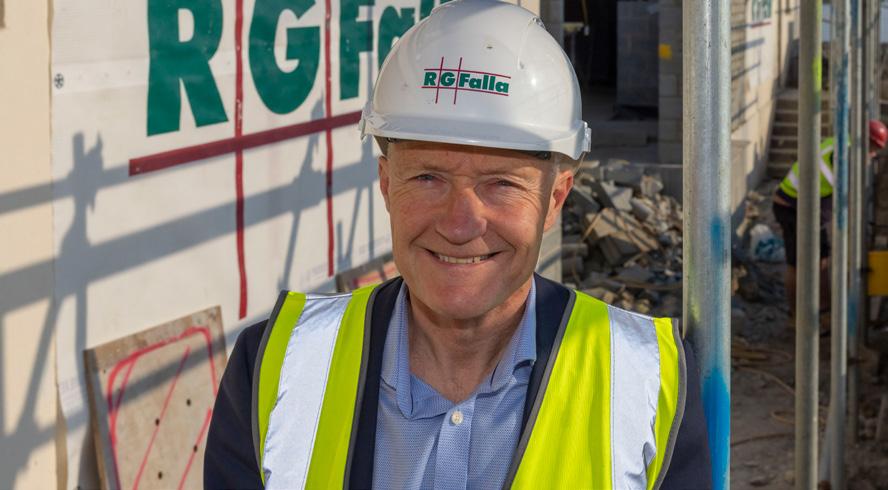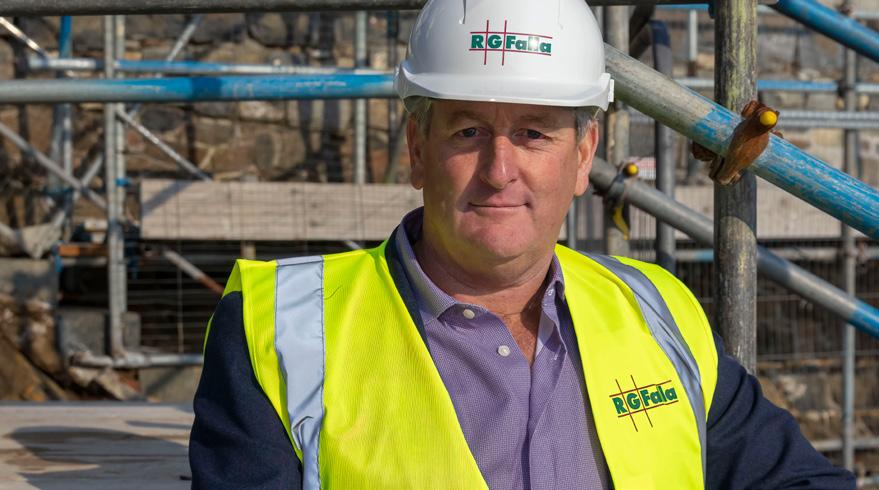
33 minute read
Estate Agents
MEET THE MANAGING DIRECTORS
MARK PALFREY
Advertisement
Managing director 2017 - 30 June 2021
How did you get into the industry?
“It was really by chance. I wanted to be an architect and obtained the necessary O Levels at my secondary school in Brighton. The careers advisor there told me to do a full-time course at the polytechnic but they didn’t mention that it could be sponsored by an employer. By the time I realised that and wrote to architectural practices, they had all filled their intake. A builder sponsored me, but they were looking for a quantity surveyor so I ended up taking that route. It’s been a career I’ve thoroughly enjoyed.”
Why Guernsey?
“I was working in the south of England and RG Falla advertised some vacancies in a Southampton newspaper. A colleague showed it to me and suggested I apply. After an interview in a Southampton hotel and another one in Guernsey, I decided to come over on a threeyear licence. Then I met my wife and stayed.”
Proudest achievement?
“Working in construction, you’d think it would be the projects we’ve completed, but actually for me it’s the personal development you see in others. I get such a buzz from helping colleagues to find their full potential through recognising their strengths and helping them grow and succeed.”
CV highlights
Mark has moved around many areas of the Garenne Group in both Guernsey and Jersey including heading up RG Falla, AFM and Camerons. He is currently a Garenne Group main board director. Mark is a former chair of the Guernsey branch of the Institute of Directors, a former chair of the Guernsey branch of the Chartered Institute of Building, a former president of the Jersey Building Employers Association and he has twice chaired the Guernsey Building Trades Employers Association.
How did you get into the industry?
“I passed eight O Levels, but only did really well in maths so decided to start A Levels in pure and applied maths. I lasted a term before a careers advisor suggested I start an OND course (equivalent to BTEC level 3) in Bournemouth. I excelled at that so I progressed to an HND in London. I was sponsored by Higgs and Hill, which meant I would spend two terms at university and then the summer out in industry. I spent my first year learning engineering, my second quantity surveying, and my third planning, before graduating and taking up a management role with Higgs and Hill in Poole.”
Why Guernsey?
“I initially worked with a great team, with a top-notch construction director in London. I learned a great deal from him and working on that project. His next project was the construction of the new A&E and radiology departments at the Princess Elizabeth Hospital. He asked me to join the team for Guernsey and I jumped at the chance. I knew the island well and had visited many times as a competitive swimmer. On completion of the PEH project, I joined RG Falla and nearly 30 years later …”
Proudest achievement?
“I’ve worked on a huge range of projects. When I first joined RG Falla I started working at Credit Suisse, then moved on to the MSG development before working at the High Street Boots store to create the lower level. When I look back at the portfolio we’ve created over the past 29 years – Les Beaucamps School, Grammar School Sixth Form Centre, Garenne Stand, Generali, The Ladies’ College – I’m very proud of all those projects, very proud of the team involved in each project and very proud to be part of RG Falla.”
CV highlights
Prior to taking up the managing director role, Paul was construction director at RG Falla. He has previously worked as site agent and project manager on many of the firm’s notable projects. In April 2014 Paul became a liveryman of the Worshipful Company of Constructors at a ceremony at the Stationers Hall in the City of London. He is currently the president of the Guernsey Building Trades Employers Association.

PAUL MASON
Managing director from 1 July 2021
ESTATE AGENTS

From residential to commercial, and sales to rentals, Guernsey’s property market is booming across the sectors. But what’s the story behind the headlines? The island’s leading estate agents and experts share their thoughts on the industry and offer advice on everything from how to rent your home to how to get the right mortgage.
Getting mortgage ready
Mortgage demand in Guernsey is high and the short supply of available housing stock means purchasers need to move quickly. It is therefore more important than ever for home buyers to be ‘mortgage ready’. Roger Hughes from Skipton International gives his advice.

If you have been following what’s going in the property world, you’ll be well aware there are currently numerous incentives for anyone who wants to buy a home. While some of the high street banks offer 95% loans, local mortgage provider, Skipton, currently offers all local residential mortgages on a fee free basis.
But don’t get excited just yet… there’s still the small matter of the mortgage lenders’ checks. When you apply for a mortgage, you will have your finances and income scrutinised and, even if you have the required deposit, if you don’t pass affordability tests you may still be rejected.
Fortunately, there are a number of things you can do to improve your chances of getting that all important ‘yes’ from a mortgage lender. In fact, getting yourself mortgage-ready won’t just help you get accepted, it will also mean you could beat others in the queue for a property.
Here are some tips to help anyone preparing to take out a mortgage get themselves into the best place possible before applying.
Save, save, save
It’s always best to research your savings account options to make sure you’re getting every possible penny of interest. Whilst rates are currently low, every penny can count when saving for your deposit.
The amount of deposit you need to save varies according to the mortgage you take out. In certain circumstances, it is possible to obtain a 100% mortgage, such as Skipton’s Next Generation Mortgage, with parental guarantee, but it is always wise to have savings behind you for legal fees and moving costs.
Affordability
Mortgage lenders will consider a number of factors when providing property funding. The property itself needs to be a safe bet, which is why a surveyor and conveyancer are always enlisted, but the primary discussions will revolve around you, the applicant.
Mortgage providers will look at your salary and age, and consider income and expenditure. Skipton International focuses very much on affordability. What can you afford to pay each month? Obviously, income is considered, but so are things such as car loans, store cards and children. It stands to reason that children cost money, so affordability is crucial if you are to take on a loan and be able to repay it month after month.
Credit search
Understanding how credit records work, and how they could be improved is the first step to ensuring you are in the best possible position to apply for a mortgage. As part of the underwriting process, Skipton International uses TransUnion and Channel Island Data Services (CIDS) to obtain a copy of your credit report. The report will not show who you have credit facilities with, but will confirm your credit limits and your repayment history.
Try to avoid new debt in the run up to applying for a mortgage
Try not to overburden your credit card or use your entire overdraft, as lenders may think you’re in financial difficulty. Equally, applying for credit too often can reduce your chances, as each application is marked even if you’re not approved.
Approval in principle
The best option is to arrange to chat to one of Skipton International’s friendly mortgage team. It’s entirely free and they will run through the whole process with you, as well as advise you on your specific circumstances. They will base any decision on affordability, and are often in a position to lend more than others. An approval in principle can often be given in minutes, meaning you can confidently start to view properties, knowing you are in the best possible position to move quickly.
An unusual year for the industry
The immediate recovery of the local property market was one of the major economic stories, and perhaps surprises, of 2020. A similar bounce back has been recorded after 2021’s lockdown. Livingroom founder and CEO, Simon Torode, shares how the industry has reacted to the boom, and explains how digital services have helped surmount the issues posed by travel restrictions and lockdowns.

Livingroom was 15 years old in January of this year, so we’ve got plenty of experience in the Guernsey property market. But I’ve never seen anything like what happened after the Covid-19 enforced Bailiwick lockdown of 2020.
It seemed that the whole of Guernsey wanted to be on the move to a new parish, a bigger house, or out of their childhood bedroom or suddenly intolerable flat share.
It’s certainly the case that being stuck at home forced many to re-evaluate what they want and value from the place we call ‘home’. We had countless conversations with sellers and buyers who were perfectly happy with their home in late 2019 but, after three months stuck inside it, realised it either didn’t work for them on a practical level, wasn’t what they wanted anymore, or simply didn’t make them happy.
With lockdowns and travel restrictions interrupting usual market activity and viewings, we’ve turned to digital services more than ever to continue to reach customers all over the world.
A digital present and future
For us, our digital presence has always been instrumental to what we do.
Pre-Covid, Guernsey already had a reputation for providing a high-quality lifestyle for many. But for those who were previously unaware of the Bailiwick, our low Covid levels and secure borders have placed us in their spotlight and offered a tangible and safe location to relocate to. This has driven significant increases in digital traffic from the UK, Europe and further afield.
Our ability to provide digital solutions meant we were able to host video viewings for prospective residents based overseas (and for some based on-island) and some even bought properties on the strength of a video viewing alone. The world can be shrunk by video conferencing technology such as Zoom, which is perhaps another reason why most can now choose to relocate to our island and work remotely with global markets. Providing the investment continues to be made in more reliable networks, Covid has proven that working from a remote location can be just as effective, is commonplace and perfectly acceptable.
Guernsey grows in popularity
Guernsey is enormously attractive for many reasons but to those who currently face hours of commuting and rarely see their children, it’s no wonder we are seeing considerable enquiries from potential residents.
What’s really exciting for Guernsey is the changing demographic of newcomers. We’re seeing an increase in families with young children seeking true involvement in our society together with techsavvy inspirational leaders moving their companies here – often providing great job opportunities for islanders in exciting global businesses. These types of residents can change island life for the better and mark a revolution in inward migration that Guernsey should actively embrace.
Whichever way you look at it, change has already happened. We’ve all faced complications, issues and even lost loved ones from an unexpected virus; yet it appears that if we are happy at home, it’s easier to deal with a constantly changing world.
Navigating the rental market
Estate agency, Carré Property Limited, has a particular specialism in rental properties, and founder Julie Carré has a wealth of experience in the sector. She told us how the past year has affected the rental market, and offers advice to landlords and tenants on how to navigate the current situation.

The rental market is incredibly busy at the moment and has been for quite some time - since we came out of the first lockdown in 2020. There is a shortage of properties in all sectors and demand is outstripping supply.
There are many factors fuelling that demand, but one of the main drivers seems to be a high number of people coming over to work on the island – from single persons to families. Lockdown restrictions have also given people a chance to re-evaluate their life choices and some are now looking for properties with additional space to allow them to work from home, or those without any outdoor space are looking for garden areas.
While there is plenty of demand, rental properties themselves are in very short supply.
The recent buoyant sales market has opened up opportunities for landlords to obtain very good prices for their properties and many have decided to sell their investments at this time. This in turn has created a shortage of rental properties across the market. Many people currently looking for a home to rent are having to do so because their landlord has decided to sell rather than extend their lease.
I’ve worked in this business since 1981 and I have not seen a situation like this before. I believe it will continue until there are new properties available to rent. There are many local families in very difficult situations as they are unable to find an affordable home to rent. It is particularly difficult for those with pets as unfortunately many apartments are either unsuitable due to lack of outside space or the property schedule for the building not allowing pets.
For those already in properties, we have seen that, where leases have been extended, many of our landlords have taken into consideration their tenant’s situation during lockdown and kept their rent at the current figure, rather than applying an RPI increase. On the other side of the equation, tenants are also aware of the shortage of alternative properties and most have decided to renew their leases this year, rather than look to move.
For anyone looking to try to rent a property, my advice would always be the same. I would recommend that they regularly phone the estate agencies to ask about any new instructions. We are getting email enquiries from many people to go onto the mailing list daily and this list is extensive. Whilst we always try to contact people as soon as something suitable comes available, it can take hours to work through our lists and, unfortunately, someone will always be disappointed.
With this demand, there is obviously the opportunity for new landlords to enter the market. However, we would always recommend that people think carefully about the type of property they would be intending to purchase before planning to become landlords. Certain properties are more suitable for rental, and we are always happy to point prospective landlords in the right direction. They need to consider the age and general condition of the property, together with any service charge payments, its location and the availability of good parking facilities – whether on site or on-street. Property is a good long-term investment but a landlord must realise there will be ongoing maintenance payments to keep the property in good order. We know that good landlords attract good tenants, and we pride ourselves on offering a service to help both.
UP FOR SALE: HOW TO SELL YOUR HOUSE SUCCESSFULLY
If you’re looking to put your house on the market, there are a few simple things you can do to make it more attractive to prospective purchasers. Here are our top tips – as well as a few pitfalls to avoid.
DO
Make a good impression – first impressions matter, so make sure your front garden is tidy and give your front door a clean.
Keep it clean – inside and out, make sure your house is spick and span. Deep clean the house before photos and viewings, and don’t forget things like cleaning the windows.
Clear it out – a good declutter can make your house look bigger. Clear your surfaces and tidy away items such as toys as much as you can.
Time it right – Guernsey’s property market might be booming at the moment, but usually you should think about the time of year to put your house on the market. The winter, and times such as Christmas, are notoriously slow. Stick to spring and summer if you can.
DIY – all those little jobs might be easy to ignore when you’re living there, but get them done before you put the house on the market and it will be more attractive.
DON’T
Do too much – while a lick of paint can help make your house more attractive, don’t waste money on things like a new kitchen or bathroom. You won’t make the money back in the sale, and many people buying a house would rather choose their own.
Make it personal – clear away family photos and very distinctive items. You want the purchaser to imagine themselves living there rather than seeing it as your home.
And finally, it’s always worth getting a fresh pair of eyes to look at the house before you put it on the market. Ask a friend or family member for an honest assessment – they might be able to spot the things you’ve missed, which might make all the difference when it comes to a successful sale.

Carré Property are able to provide assistance and advice on all aspects of local market residential property sales and specialise in lettings and property management. Established in 2008, we can assure all clients that they are dealing with a professional agency who will provide them with the security, experience and reliability expected. We have an excellent team of tradesmen available and will ensure your property is in safe hands 24 hours a day, 365 days a year.
If you are looking for a professional, responsible and efficient agent to care for your rental property please call our office on 249168 to discuss your requirements in further detail.
Members of Association of Residential Letting Agents (ARLA Propertymark), Fellow of the National Association of Estate Agents (NAEA Propertymark), Regulated by the GFSC, Members of the Property Ombudsman Scheme and Propertymark Client Money Protection Scheme.
A new business for a new era
Jon Sheppard set up his new estate agency just as the Covid-19 pandemic took effect last year. A year on, he looks back at why he established Sheppards Estate Agents and how the business has fared in this most unusual of times.

I opened an estate agency as the world plummeted into a global pandemic.
At first glance, that does not sound like it would go to plan. Following 20 years as an employee in the property industry, I decided that I wanted to merge all of my acquired skills to benefit people wishing to buy and sell property in Guernsey. This experience, combined with my desire to deliver excellent customer service, finally forced my hand to set up Sheppards Estate Agents 15 months ago. It’s been a whirlwind ever since.
If you are currently looking for property, you are likely stood in a long queue. In less than a year, Guernsey’s property market has gone from having ample housing stock, to a market drier than the Sahara, thus causing the highest annual rise in house prices since records began. There is currently a huge demand for property, likely as a direct impact of the pandemic and national lockdowns – Guernsey has quickly become ‘the place to live’.
Quality property on island is like gold dust: “We saw a property we liked, called to book a viewing and 15 minutes later received a call back to say it had gone!” What would have been a highly unusual situation a year ago has become a common occurrence for anyone stood in the current queue for local property.
Quality property is here in Guernsey, but you must be as lucky as a leprechaun with a four-leaf clover to be chosen as a purchaser. To keep up with this demand I had to ensure my new company was competitive with Guernsey’s long-standing estate agents, during a pandemic and through two lockdowns – no pressure there then!
Having a good digital presence is so important and can often be the make or break difference between winning an instruction or losing it. Sheppards exists not only with a physical office but through our own website and social media platforms. It is an easy way to chat with people about their property plans, needs, wants and wishes.
As a vendor you will go to great lengths to make your property stand out so we utilise our digital presence to highlight the best of your property in every way we can. Often this starts with photos, so I send in Jasmine - our creative guru, who prides herself in getting our clients exceptional photographs of their property. Our closeworking team also includes Lisa - our business support, who monitors emails and calls to ensure everyone can reach us and be responded to very quickly, if not instantly at times.
Finally, I am the managing director who thrives in this busy environment and ensures that the ship runs smoothly. As a small business we not only know the finite details of each and every property on our books, we know and understand you.
We should be up and running in our new St Martin’s office later in the year and would love you to come along and check out our new premises, where you can stop for a cup of tea and chat about your property journey with myself, Jasmine or Lisa.
Let Sheppards guide you home


Guernsey’s newest estate agent
Commercial property in the Channel Islands
Alex Titheridge is the new managing director of D2’s Guernsey office. Although a newcomer to the island, he has had a longstanding interest in the Channel Islands and has been involved in transactions in both Jersey and Guernsey during his career. Here, he shares his first impressions of the commercial property sector and what he hopes to achieve in his new role.

When I’m asked why I wanted to move to the Channel Islands, the varied role and the challenge of running a multi-disciplinary office was certainly one of the attractions of relocating. I have worked with Phil Dawes and his team in Jersey previously and was impressed with the forward thinking and professionalism of the business. Guernsey is a key area of growth for D2 and I’m excited about cementing them as the number one commercial property advisor in the Channel Islands.
Being new to Guernsey, getting to know the people and the island is my priority. There are many nuances to the Channel Islands and it will take time to appreciate them and build local market knowledge. Part of my role is also to be a conduit to the UK and demystify the Channel Islands for the mainland market to open up new opportunities.
D2 has recently released a report reviewing the importance of the office to Channel Islands’ occupiers. As businesses implemented their ‘working from home’ strategies during the various lockdowns, the big topic was what the future held for offices.
What was clear is that we need to create the right office environment. Those landlords who do not work collaboratively with occupiers will quickly get left behind. Occupiers are demanding much more from their offices and are expecting better quality amenities and a focus on sustainability to encourage wellbeing. This should be a key focus when refurbishing or marketing empty space and developers need to be forward-thinking and creative.
Over the past year there have been some notable successes in Guernsey, where landlords have delivered contemporary workspaces in buildings that have been vacant for many years and been rewarded with them being pre-let, such as Windsor House. It shows that demand is there for the right product. In terms of investment performance in the Channel Islands, it appears to have come through the pandemic unscathed, particularly when compared with the UK. The market is seen as a safe haven for investors seeking yield and long leases let to strong covenants, so demand remains strong and yields have held up well.
I was involved seven years ago in the previous sale of Admiral Park’s Trafalgar Court and D2 has recently been instructed to sell the property again, with a quoting price of £60m. It’s obviously a prestigious instruction for the business but is also a huge inward investment opportunity for the island, and should be a good barometer of the market.
I am hopeful about the political will to reduce bureaucracy around the planning process and deliver much-needed commercial and residential projects. It’s something that has been successful elsewhere, such as permitted development rights in the UK (where redevelopment or refurbishment can occur without the need for planning permission).
For Guernsey, I think it would have a particular impact on the potential to re-purpose older and obsolete office stock. That is not necessarily straightforward in St Peter Port, given that many buildings are listed and their configuration may not suit conversion. But with such a huge surge in demand for residential property on the island this would seem a natural solution.
Another theme that is becoming increasingly relevant across our managed portfolio (now worth £500m+) is the importance of Environmental, Social and Corporate Governance (ESG). Occupiers and landlords alike are becoming increasingly aware and, with both Guernsey and Jersey’s drive to be carbon neutral, we see this as a major focus. This is an area where the property manager can make a difference and is something we have been focusing on for some time now. We suspect the days of property managers simply collecting rent will soon be a thing of the past and they will need work collaboratively with both landlords and occupiers to provide meaningful solutions.
Property market rallies despite the challenges of the pandemic
Carey Olsen partner Jason Morgan, head of the Guernsey property team, looks back at the past year to assess the impact of the pandemic on the island’s property and bond activity.

The impact of the coronavirus pandemic on the local property market over the past 12-15 months has been stark – with record highs and record lows for quarterly activity a regular occurrence.
Let us not forget, we began 2020 having just ended 2019 with the Guernsey local market experiencing its highest level of annual sales activity since 2011. Indeed, the figures for 2019 as a whole, showed a 4% rise on the total recorded for 2018, with 879 local market transactions.
However, roll on three months and much had changed, not only in Guernsey but also across the world. Lockdown restrictions introduced in March 2020 saw quarterly figures drop, just as they were on course to beat previous highs, while upon entering Q2 we saw only 15 local market houses and flats change hands during April – the fewest for any month from available records. It meant that in Q2, we saw the lowest level activity for four years.
Things changed though in Q3 and Q4 of 2020 with confidence returning to the property market unabated, and a post-lockdown surge delivering the highest combined total of house and flats sales seen in Guernsey during any quarter since Q4 of 2006 – first for July to September, but also October to December. It meant that for 2020 as a whole, the Guernsey local market saw a total of 1,017 transactions take place (766 houses and 251 flats). This was 16% more than the total recorded in 2019 and the most for any year since 2007 when 1,145 local market properties were sold.
The first quarter of 2021 was of course affected by Guernsey’s second lockdown, but either side of that period, activity and confidence in the market has remained strong.
The strength of performance of the property market has also perhaps predictably been reflected by the number and value of bonds (documents securing lending against real property) registered on the Greffe records. Indeed, the total number of bonds registered in 2020 (some 1,200) was almost identical to the number registered in 2019 and the highest number of bonds recorded since 2012. More notably, the value of the bonds registered in 2020, of just over £500 million, again an almost identical figure to the one recorded in 2019, was higher by over £100 million than in any of the last 10 years and higher than in any year since before the financial crisis.
So why the appetite of so many to commit to borrowing such large sums of money to buy new properties and re-mortgage existing ones during a pandemic, given all the uncertainty created by it around economic, working and other conditions, for the future? And why too, in such circumstances, the enthusiasm of more lenders to the market than at any point in the recent past (a mix of some 10 or so high street and private banks and peer-to-peer lenders) to make such finance available?
Where borrowers are concerned, the fact that interest rates remain so low and employment prospects in Guernsey are showing no imminent signs of being adversely affected by the events of the last 12 months, must be the main drivers for the dramatic uplift in borrowing. An additional factor will almost certainly be that those with any savings at all, will likely regard an investment in Guernsey real property to be as safe a bet, both in income (for rental properties) and capital terms, as it ever has been. Certainly, such an investment will be seen by many as trumping putting cash in a bank, or speculating on other investments that are either now, or likely for the future, to be impacted by the turmoil circling financial markets.
More than any of the factors already referenced, however, is the fact that Guernsey, notwithstanding the pandemic and perhaps in some ways because of it, has never been a more attractive place to live or relocate to.
Guernsey’s housing boom - what does it really mean for first-time buyers?
Ogier’s Guernsey property expert, Advocate Martyn Baudains, advises on all aspects of residential and commercial property. He delves behind the headlines to look at the reality for those looking to buy a property in the island.

The past year has seen no shortage of media coverage about Guernsey’s “runaway” housing market and its “unrelenting” rise in property prices. But is there more to the statistics than the headlines suggest?
Figures show that the average local market purchase price was just shy of half-a-million pounds in the fourth quarter of 2020, a figure of £493,174 and a 5.9% rise on the previous quarter, and 11.8% higher than the fourth quarter of 2019.
This amounts to the largest annual rise in average property prices since 2008, and unofficial figures for 2021 show the local market median for the first quarter currently stands at a hefty £550,875 – all of which makes for discouraging reading for local buyers.
These numbers seemingly put home ownership way beyond the means of most people not already on the fabled ladder, impacting younger and first-time buyers, in particular. And with estate agents speaking publicly about a lack of available housing on the market, it’s little wonder that concerns over Guernsey’s affordable housing crisis have heightened.
But while certain sectors of the local market have seen a boom in prices, this is not the full story, as the way these statistics are reported is often too simplistic.
What we’re seeing is a real demand for property in the £400,000 to £700,000 bracket, which is really driving the average price up. We’re seeing movement at the top end, too, but perhaps not quite so pronounced. At the lower end of the market, however, you could argue that there’s not been a great deal of change in 13 years.
According to the latest data obtained from the Greffe, the median price of the 20 local market flats sold in March 2021 was £277,875, which is less than some months in previous years, going all the way back to 2008. We recently saw a flat conveyed at the same price as it was bought for in 2008. There has been less activity at the lower end of the market, which is good news if you’re a first-time buyer looking at that price bracket. Talk of a local market boom can be quite disheartening but the truth is that properties at the more affordable end of the market are still available.
Unofficial figures show a fall in overall sales activity in the first quarter of this year, with sales at their lowest quarterly level for many years. There are a number of possible reasons for this including the fact the courts were closed for all but essential business for a couple of months and estate agents reporting a shortage of properties for sale.
There are, potentially, a lot of new housing developments on the horizon in Guernsey. Development Frameworks for sites such as the Pointues Rocques development suggest it may be suitable for 75 to 125 dwellings, and the Belgrave project could see anything between 100 and 300 units of accommodation built. New housing inevitably has an impact on the market - if you introduce new properties to the market, buyers have more choice and that means property prices see an adjustment downwards.
The rise in average house prices comes as no surprise and, in fact, is not even a local phenomenon, with property markets in Jersey and across the UK having also experienced a surge in activity and similar increases in prices.
Quite simply, lockdowns have resulted in people reassessing their housing needs and wants. But prices at the first-time buyer end of the market haven’t changed much, or at all, so they still remain attainable for those looking to get their foot on the ladder. As the impact of lockdown on the economy unfolds and restrictions lift, it’s going to be an interesting year for the local market. But it’s always worth reading between the lines before taking the headlines at face value.
Added protection
Collas Crill’s head of property, Paul Nettleship, looks at the role of collateral warranties and what to consider when requesting one from a contractor.
A collateral warranty is a contract which gives rights to a third party in respect of an existing contract entered into by two separate parties, e.g. the purchaser of a building and/ or a tenant, neither of whom was a party to the construction contract. They are issued in a standard form and rarely specifically drafted.
The effect is that parties who have an interest in the building can sue the designers and/or contractors (the construction team) for defects in the building arising out of their negligence even though there is no contract with them.
In the institutional market, third parties now expect warranties to be granted in their favour so it is important for a developer to have the ability to procure warranties in favour of these parties. That ability needs to be written into the original appointments by the landowner.
Who are warranties needed from?
As a general rule, warranties are required from the main contractor (whether or not they have any design responsibility) and all parties who have a design input into the work.
It is only possible for the construction team to insure against negligent design and not negligent works. There is little point therefore in obtaining warranties from subcontractors who have no design responsibility and who can often be of little net worth. In addition, main contractors and consultants may take full responsibility for design of their subcontractors or sub consultants, so that additional warranties may not be necessary.
Things to consider
Ideally, the following parties should be granted collateral warranties in relation to the works:
1. a future purchaser of the building; 2. future tenants of the building; and 3. financing parties.
When looking at collateral warranties, a funding institution’s primary motive will be to obtain as much protection in relation to the money that they are lending over and above any other security taken over the property.

A purchaser of a freehold development will want to be in a position to make claims against those responsible for the design and construction of the development should something that they have done, or not done, cost the purchaser money.
Similarly, tenants of leasehold premises will be looking to protect themselves from a liability to repair the building. In respect of those issues therefore, tenants, purchasers and funders would have an interest in common, seeking to pass as much risk as possible to the parties who have created the development, i.e. the architect, the engineer, the quantity surveyor, the contractor and sometimes any major subcontractors.
Although collateral warranties are generally requested and issued, it is worth bearing in mind that the long-term reliability of such warranties as a means of protecting building owners and occupiers may be subject to some doubt: • Collateral warranties are only of any value if the party who has given the warranty has the assets to support a claim, or has professional indemnity or another insurance policy to cover the claim. • Professional indemnity policies exist to protect the interests of the insured professional not the building owner. • Claims under most collateral warranties depend upon establishing negligence and such claims are normally strenuously resisted. • Professional indemnity policies are usually annual in nature and renewal depends upon the claims record of the particular consultant or contractor in the previous year, thus there is no guarantee that the policy will always be available in future years. Policies of this nature are also subject to terms, conditions, limitations and excesses which are beyond the control of the developer or his successors.







